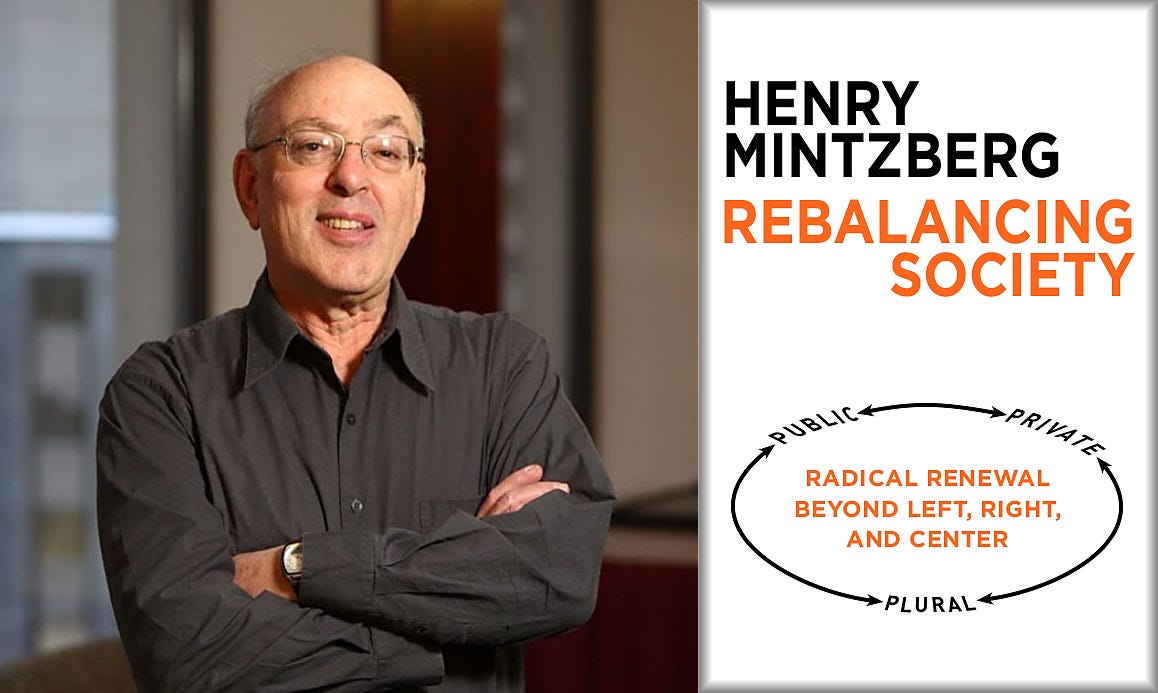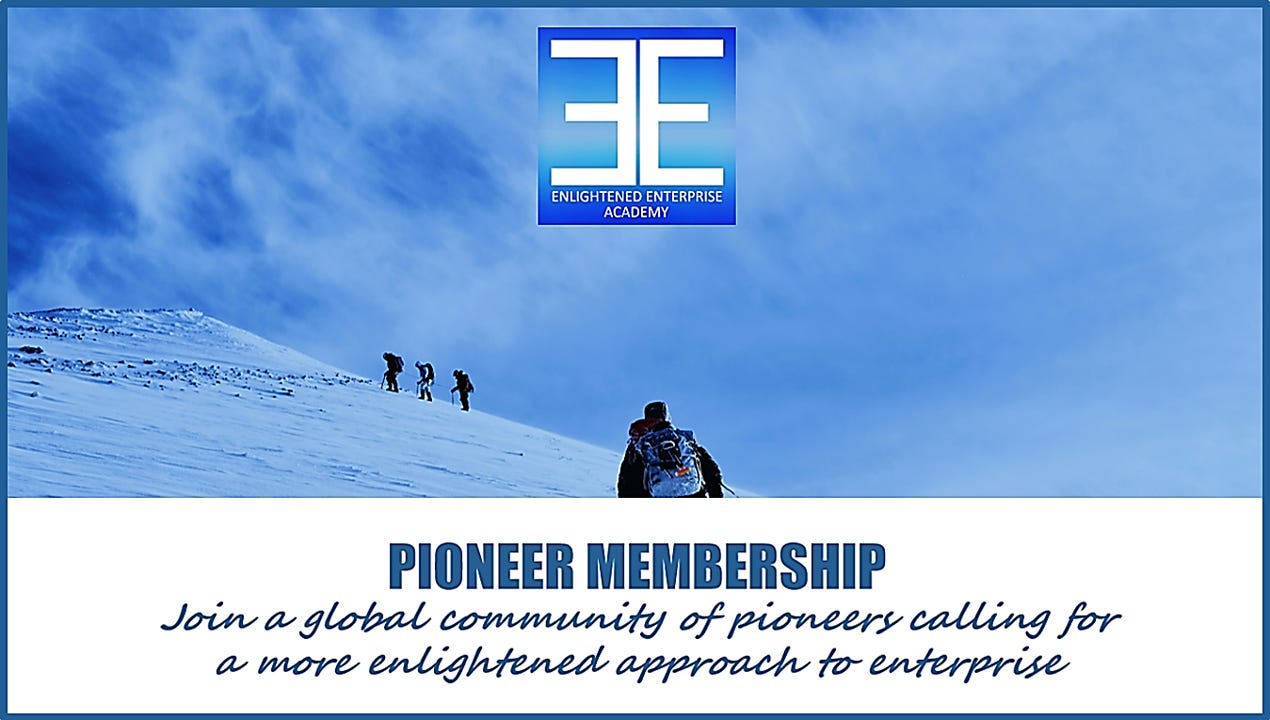“In an evolution of our founding objectives the Enlightedned Enterprise Academy we will seek to support the rebalancing of society by fostering enlightened approaches to enterprise in all sectors - private, public, and plural - plus greater cooperation and collaboration between all three. No sector should be marginalised in the way the plural sector has been by the private and the public sectors.”
Paul Barnett, Founder, Enlightened Enterprise Academy
The Back Story
Since our foundation, the Enlightened Enterprise Academy has advocated that the purpose of any business or organisation is the creation of value. And that should be measured in terms of sustainable contributions to the common good of society. This applies to enterprise across all three sectors of society - the three Ps.
Plural Sector?
You will be familiar with the first two, the private and the public sectors, but you may be wondering what the Plural Sector is?
It includes civil society, plus other entities owned by neither the private sector nor the state, including foundations, community groups, cooperatives, unions, places of worship etc. They sometimes referred to as the “not-for-profit” sector or “the third” sector. Sometimes they are owned by members, often they are owned by nobody. Henry Mintzberg introduced the term Plural Sector in his book Rebalancing Society: Radical Renewal Beyond Left Right and Centre (2015).
In healthy societies there is a balance of power and influence between the three sectors, each is able to hold the other accountable. Henry is not the only person to warn about the dangers of today’s very unbalanced society.
In The Third Pillar How Markets and the State Leave the Community Behind (2019) Raghuram Rajan makes similar arguments and a call for a rebalancing, but he uses the term community instead of civil society or the plural sector.
The arguments made by Mintzberg, Rajan are compelling. They are also deeply rooted in the arguments made by leading thinkers since the time of the ancient philosophers.
Experience shows that imbalance can lead to deeply dysfunctional societies in which the chances of businesses, governments, and people being able to thrive are diminished, and their survival may ultimately be threatened. It should also be remembered that in a functional society governments and private sector organisations are given a license to operate by society, in return for meeting their obligation to serve the common good. This is often forgotten, but we would do well to remind the private and state sector actors of this fact. As individuals it would be in all our interests to do so, since we are all citizens of a society first and foremost. Any other role we may have is secondary.
Rebalancing Society With Enlightened Enterprise
The Enlightened Enterprise Academy supports the calls for a rebalancing of society. This represents evolution of the statements made when the academy was founded in 2020, not a departure from them. It also represents a stronger, bolder, statement. And we make it now because in just five years since the establishment of the academy many societies have become far more dysfunctional, due to the imbalances Mintzberg and Rajan speak of.
This dysfunction is widely felt and recognised. It is perhaps most evident in the scale and frequency with which our businesses and organisations find themselves challenged by crises. And it is reflected in the loss of trust in institutions; a collapse of confidence in democracy; the rise of populist and extremist political views etc.. We also see it in other social indicators; of the growing dissatisfaction in society, and in the breakdown of social cohesion.
These factors add to other 21st century challenges related to climate change and the depletion of natural resources, including increasing numbers of natural disasters, mass migration, rising geopolitical tensions, growing economic costs etc. Collectively they represent what is being referred to as a Metacrisis, a Polycrisis or Permacrisis. Though each of these terms have different meanings the causes are all similar.
The End of One Epoch and the Start of Another
Though not yet widely recognised, the Metacrisis. and all the associated aspects of it, are symptoms of the ending the Enlightenment Epoch we have been living through for three centuries. This will be fully explained in The Better Way: Enlightened Enterprise, a book project that our Founder, Paul Barnett, is working on. The project, and the argument that we need a New Enlightenment is we are to address our 21st Century challenges is introduced in this video:
Transcending from one epoch to another is very disruptive, as it was when the Renaissance gave way to the first Enlightenment. Abd it will be made far worse if we fail to restore the balance between the three pillars of society. And enlightened leaders in all the sectors accept that this is the case.
From now on the Enlightened Enterprise Academy’s purpose will be to serve those enlightened leaders, We regard them as pioneers because they see the change that is needed in the world. They adapt their behaviour to achieve change. And they want to encourage others to change.
As Mintzberg suggested we need to move “beyond left, right, and center.” Doing so will be essential in the pursuit of enlightened enterprise objectives. What we advocate has political consequences, but we are not taking a left, right, or centre position, nor any partisan positions.
The Enlightened Enterprise Academy takes inspiration from progressive thinkers past, present, and future, where their thinking is aligned with our objectives. And we will share that thinking to inspire and support our members.
Shared Dialogues
In very practical terms, everything we do from this day forward will aim to encourage dialogue between those engaged in enterprise in each of the three sectors, to start to break down the barriers between them and to foster integrative thinking between them.
We need people in all sectors to share a common language, understand each other better, and be more willing to collaborate and cooperate with one another. And none of these three pillars should be excluded or marginalised in the way the third pillar has been.
Shared Narratives
As a very important starting point, we will facilitate dialogues between representatives of the three sectors, to craft a shared narrative about the importance of restoring the balance between the three pillars. It must be a narrative that each can support and feel confident sharing with others in their sector.
This initiative is based on a theory of change that emphasises the importance of new narratives in re-shaping mindsets, because the way we think changes behaviours, and the narratives we share reenforce existing behaviours. And, over time, this initial shared narrative will be expanded to include many more on specific topics and issues.
Shared Learning
Overcoming the disconnect between the three pillars will be made possible by encouraging the participation of representatives of three in the events and programmes we offer. We will also ensuring our publications and communications are speaking to them all.
It is easy to see how that will be possible through some of the work we have already been doing in critical systems thinking and the management of complexity. For example, many of the approaches are specifically designed to engage a broad range of stakeholder interests.
Our Multidisciplinary Faculty
From the outset it has been our intention to establish the world’s largest multi-disciplinary faculty of experienced practitioners and pracademics (academics that have real world experience and wish to make a positive impact in the real world).
Our goal of serving the pioneers of enlightened approaches to enterprise in each sector, and of encouraging cooperation and collaboration between them, will be further enhanced by intentionally attracting faculty members with relevant interests and experience.
It will also be more important to encourage the faculty to work together to ensure our products and services are best able to provide value to people in each of the sectors.
If you agree with what has been said above, you may be interested in joining our Faculty?
This Story Will Continue
Further details will be shared as we make progress. We will also provide explanations of how and why society became unbalanced to provide additional context.
Your Thoughts?
Your thoughts on the ideas shared in this document would be very much appreciated. paul@enlightenedenterprise.ac
Your Support?
We need to move boldly, and we need to move fast. We therfore need your support.
JOIN US AS A MEMBER and get full benefits. Or by subscribe to The Salon and / or The Better Way book project.








I like that idea of the plural sector / civil society and its importance in terms of checks and balances. It reminds me of the book „Crowdocracy - The End of Politics“ by Alan Watkins & Iman Stratenus, which proposes that government systems are going through a kind of evolution and democracy will not be the end of this process. There will be further stages of evolution which are better suited for the conditions of today‘s complex world with all its messes and wicked problems. One possibility might be „crowdocracy“ a decentral, self-organized way of decision-making like we already see in examples like Wikipedia.
I am very pleased that you find the focus inspiring and exciting. I think there are quite a lot of examples in history, and in various parts of the world that we can learn from. But I hope we also inspire new cases.
For me the starting point is to bring representatives of the sectors together to establish a shared narrative about why it is essential we learn to collaborate across the sectors more effectively if we are to address the challenges we face. That will help establish a share understanding and support new ways of behaving / getting things done.
I do know of one recent example of the kind of approach I have in mind that I want to see become a case study. It is a very successful and enduring project, quite large in scale, that became a national reference for Brazil. There is much we can learn from it.